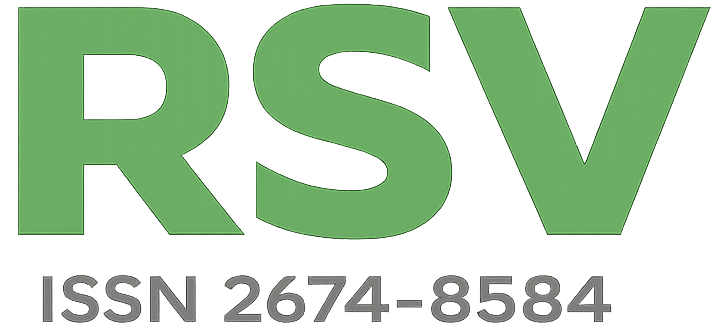A IMPORTÂNCIA DA AVALIAÇÃO DA VISÃO BINOCULAR COMO DIAGNÓSTICO DIFERENCIAL DE DISLEXIA VISUAL.
DOI:
https://doi.org/10.61164/kbf50r39Palavras-chave:
Visão binocular; Dislexia; Diagnóstico diferencial; Compreensão de leitura.Resumo
O objetivo foi identificar, nos estudos selecionados, como a visão binocular influencia o desempenho de leitura, especialmente em crianças com dislexia, e quais métodos de diagnóstico diferencial são aplicados nesses contextos. O método utilizado foi buscar no portal da da Biblioteca virtual em saúde (BVS), que apresentam dados experimentais ou de caso, oferecendo evidências objetivas sobre a relação entre visão binocular e dislexia. A busca elencou artigos publicados entre 2014 e 2024 no portal. Considereções finais: A revisão evidenciou a relação entre visão binocular, dislexia e compreensão de leitura, destacando que déficits visuais podem ser confundidos com dislexia, tornando o diagnóstico diferencial essencial. Estudos apontaram que crianças com disfunções binoculares frequentemente apresentam dificuldades de leitura, impactando a fluência e a compreensão
Downloads
Referências
CARDOSO, Heloísa dos Santos Peres; FREITAS, Patrícia Martins de. Aplicação do modelo da dupla rota no diagnóstico da dislexia: revisão sistemática. Revista Psicopedagogia, São Paulo, v. 36, n. 111, p. 368-377, 2019.
CHRISTIAN, Lisa W.; HRYNCHAK, Patricia K.; IRVING, Elizabeth L.; NANDKUMAR,
Krithika. Visual and binocular status in elementary school children with a reading problem.Journal of Optometry, v. 11, n. 3, p. 160-166, 2018.
CLARK, Robert A.; CLARK, Tiana Y. Convergence Insufficiency Symptom Survey scores for required reading versus leisure reading in school-age children. Journal of AAPOS, v. 21, n. 6, p. 452-456, 2017.
ELLIOTT, Julian G.; GRIGORENKO, Elena L. Dyslexia in the twenty-first century: a commentary on the IDA definition of dyslexia. Annals of Dyslexia, v. 74, n. 3, p. 363-377, 2024.
FEIZABADI, Monireh; JAFARZADEHPUR, Ebrahim; AKRAMI, Majid. Accommodation, convergence, and stereopsis in dyslexic schoolchildren. Middle East African Journal of Ophthalmology, v. 25, n. 1, p. 14-18, 2018.
GOULÈME, Nathalie; LIONS, Cynthia; GÉRARD, Christophe-Loïc; PEYRE, Hugo; THAI- VAN, Hung; BUCCI, Maria Pia. Vertical disconjugacy during reading in dyslexic and non- dyslexic children. Neuroscience Letters, v. 671, p. 82-87, 2018.
HANDFORD, Paula; BORSTING, Eric. Validity of the decoding-encoding screener for dyslexia. Optometry and Vision Science, v. 92, n. 4, p. 487-493, 2015.
JIMÉNEZ, Elizabeth Carolina; ROMEO, August; PÉREZ ZAPATA, Laura; SOLÉ PUIG, Maria; BUSTOS-VALENZUELA, Patricia; CAÑETE, José; VARELA CASAL, Paloma;
SUPÈR, Hans. Eye vergence responses in children with and without reading difficulties during a word detection task. Vision Research, v. 169, p. 6-11, 2020.
KELLY, Krista R.; JOST, Reed M.; BEAUCHAMP, Cynthia L.; STAGER, David; DE LA
CRUZ, Angie; BIRCH, Eileen E. Slow reading in children with anisometropic amblyopia is associated with fixation instability and increased saccades. Journal of AAPOS, v. 21, n. 6, p. 447-451, 2017.
KELLY, Krista R.; JOST, Reed M.; DE LA CRUZ, Angie; BIRCH, Eileen E. Amblyopic children read more slowly than controls under natural, binocular reading conditions. Journal of AAPOS, v. 19, n. 6, p. 515-520, 2015.
NIECHWIEJ-SZWEDO, Ewa; ALRAMIS, Fatimah; CHRISTIAN, Lisa W. Association between fine motor skills and binocular visual function in children with reading difficulties. Human Movement Science, v. 56, p. 1-10, 2017.
PHILLIPS, Paul H. Pediatric ophthalmology and childhood reading difficulties: convergence insufficiency: relationship to reading and academic performance. Journal of AAPOS, v. 21, n. 6, p. 444-446, 2017.
OZERNOV-PALCHIK, Ola et al. Distinct neural substrates of individual differences in components of reading comprehension in adults with or without dyslexia. NeuroImage, v. 226, p. 117570, 2021.
PRZEKORACKA-KRAWCZYK, Anna; BRENK-KRAKOWSKA, Alicja; NAWROT,
Pawel; RUSIAK, Patrycja; NASKRECKI, Ryszard. Unstable binocular fixation affects reaction times but not implicit motor learning in dyslexia. Investigative Ophthalmology & Visual Science, v. 58, n. 14, p. 6470-6480, 2017.
WARD, Lindsey M.; KAPOULA, Zoï. Differential diagnosis of vergence and saccade disorders in dyslexia. Scientific Reports, v. 10, n. 1, p. 22116, 2020.



